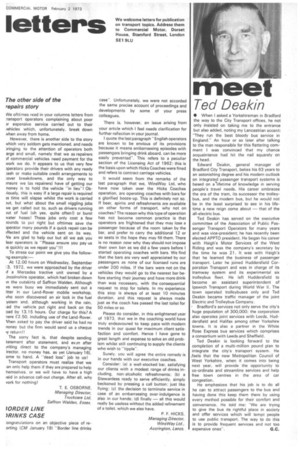letters
Page 83

If you've noticed an error in this article please click here to report it so we can fix it.
The other side of the repairs story We ofttimes read in your columns letters from :ransport operators complaining about poor )r. expensive service carried out to their /ehicles which, unfortunately, break down Nhen away from home.
However, there is another side to the story
Nhich very seldom gets mentioned, and needs lringing to the attention of operators both arge and small, namely that we as repairers yf commercial vehicles need payment for the work we do. It appears to us that very few )perators provide their drivers with any ready ;ash or make suitable credit arrangements to 1.over breakdowns, and the only way to msure we (as repairers) have of getting our noney is to hold the vehicle "in lieu"! Oh/jou*, this is easy if a large repair is required
time will elapse whilst the work is carried )ut, but what about the small niggling jobs Ne get called out to, such as drivers running nit of fuel (oh yes, quite often!) or burst vater hoses! These jobs only cost a few )ounds to put right but ofttirnes save the )perator many pounds if a quick repair can be iffected and the vehicle sent on its way. Ate are glad to help out but all we ask you leer operators is "Please ensure you pay us is quickly as we repair you"!!!
To stress our point we give you the followng example:—
At 12.00 hours on Wednesday, September 13, 1972, we were approached by the driver if a Mercedes tractive unit owned by a .incolnshire operator, which had broken down on the outskirts of Saffron Walden. Although ye were busy we immediately sent out a itter in our Land-Rover mobile workshop, vho soon discovered an air lock in the fuel ystem and, although working in the rain, lad the vehicle put right and back on the oad by 13.15 hours. Our charge for this? A nere C2.50, including use of the Land-Rover. Vhen asked to pay the driver said he had no noney but the firm would send us a cheque iy return!!
The sorry fact is, that despite sending tatement after statement, and evm after vriting direct to the company's managing irector, no money has, as yet (January 16), ome to hand. A "dead loss" job to us!
Transport operators must realize that we an only help them if they are prepared to help hemselves, or we will have to have a high mid in advance call-out charge. After all, why vork for nothing I T. E. OSBORNE, Managing Director, Truckcare Ltd, Saffron Walden, Essex.
?ORDER LINE MINKS CASE
:ongratulations on an objective piece of reorting (CM January 191 "Border line drinks case". Unfortunately, we were not accorded the same precise account of proceedings and developments by some of your press colleagues.
There is, however, an issue arising from your article which I feel needs clarification for further reflection in your journal.
I quote the last paragraph "English operators are known to be envious of its provisions because it means embarrassing episodes with passengers bringing drink aboard, can be more easily prevented". This refers to a peculiar section of the Licensing Act of 1962: this is the basis upon which Hicks Coaches were fined and refers to contract carriage vehicles.
It would seem from the remarks of the last paragraph that we, WinsWay Ltd, who have now taken over the Hicks Coaches operation, are operating coaches with bars for a glorified booze-up. This is definitely not so. If beer, spirits and refreshments are available on other forms of transport, why not on coaches? The reason why this type of operation has not become common practice is that operators are frightened that they may lose a passenger because of the room taken by the bar, and prefer to carry the additional 12 or so seats in the hope they may fill them. There is no reason now why they should not impose their own ban as we did a few years before I started operating coaches with bars. We find that the bars are very well appreciated by our passengers as none of our licensed runs are under 200 miles. If the bars were not on the vehicles they would go to the nearest bar before starting their journey and have more drink than was necessary, with the consequential request to stop for toilets. In my experience this stop is always of at least 10 minutes duration, and this request is always made just as the coach has passed the last toilet for 50 miles or so.
Please do consider, in this enlightened year of 1973, that we in the coaching world have truly endeavoured to keep pace with modern trends in our quest for maximum client satisfaction and comfort. Hence I have gone to great length and expense to solve an old problem whilst still continuing to supply the clients who wish to "tipple".
Surely, you will agree the entire remedy is in our hands with our executive coaches.
Consider: (al a well-stocked bar, satisfying our clients with a modest range of drinks including, non-alcoholic refreshments: (b) a Stewardess ready to serve efficiently, simply beckoned by pressing a call button: just like flying; (c) the decision to terminate service in case of an embarrassing over-indulgence is also in our hands: (d) finally — all this would really be useless without the added refinement of a toilet, which we also have.
















































































































































